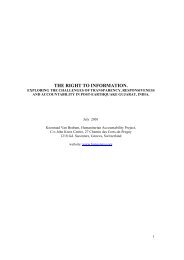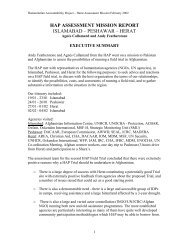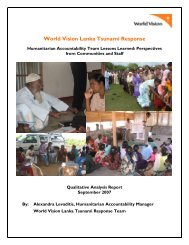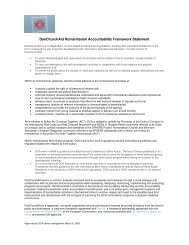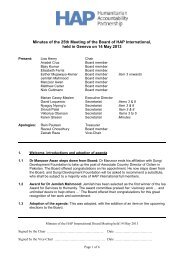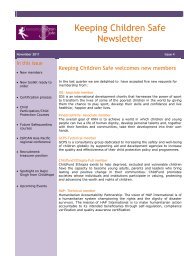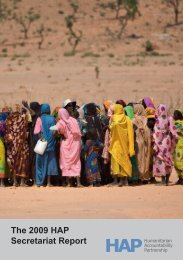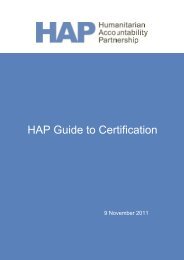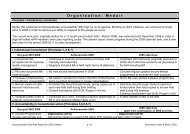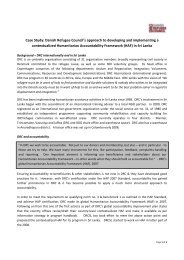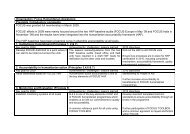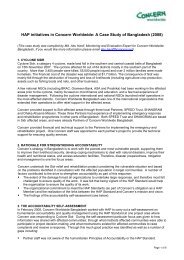Chapter Four - HAP International
Chapter Four - HAP International
Chapter Four - HAP International
You also want an ePaper? Increase the reach of your titles
YUMPU automatically turns print PDFs into web optimized ePapers that Google loves.
THE 2008 HUMANITARIAN ACCOUNTABILITY REPORT<br />
11. Mango (Associate Member)<br />
The most important factors for improving accountability were the attitudes of field staff and managers. Field staff were more accountable when they really<br />
believed that local people had the ability and the right to make decisions about improving their lives. Their managers' attitudes played a big role in making<br />
space for this, as everyone was already very busy with many different priorities and it was felt that managers did not always prioritise downward<br />
accountability.<br />
Concern staff found the approach to be useful and relevant, working across many different languages and cultures. The research output will inform<br />
Concern’s strategic planning process. In addition there is significant scope for continuing the development of the Listen First approach especially in areas of<br />
representation, participatory approaches, and understanding relationships with beneficiaries and the links to feedback mechanisms.<br />
Listen First was presented to external audiences in 2008 including BOND’s Quality Group (March 2008) and INTRAC’s NGO Research Forum (May 2008).<br />
For more information see www.listenfirst.org/about<br />
New Management Agenda: The Director continued work on the New Management Agenda, which included a presentation at Christchurch College, Oxford,<br />
in November 2008. The aim of this initiative is to alter the current methods of NGO management to be confident that funds are being used to help people<br />
effectively. The agenda advocates a transformation from results-based management (which has been shown to be consistently flawed) to a focus on<br />
performance.<br />
The whole sector needs new approaches to become more effective. Key ideas include: helping people to help themselves; NGOs constantly checking how<br />
much value they have added to the efforts of people and organisations in strengthening their own ability to tackle their own issues; beneficiaries becoming<br />
NGOs’ primary stakeholders; and maintaining consistently high-quality relationships.<br />
BOND: We have continued our active role within BOND (the UK networking umbrella for NGOs) on building standards within the sector. BOND’s board<br />
recently approved a major new programme of work on enhancing quality, which provides an exciting opportunity to build a sector-wide programme to move<br />
the debate forward and make a decisive contribution to practice.<br />
Accountability Training: Two days on our flagship-training course were dedicated to NGO accountability. Staff from international and local NGOs were<br />
trained in current research, and how they could improve accountability in their own organisations. We have also started to integrate key learning on<br />
downward accountability into other core courses.<br />
Mango continued to teach on the Masters in Humanitarian Programme Management, run through the Liverpool School of Tropical Medicine. The module<br />
focuses on accountability and effectiveness, looking at case studies, standards and the new management agenda.<br />
Mango’s Guide: Our free Guide focuses on helping NGOs develop their internal finance systems. Over 5,000 people were registered to use the Guide and<br />
over 8,000 of our Health Checks were downloaded in 2008. We continued to promote the Who Counts? Campaign on our website and in our Guide.<br />
Comic Relief Consultancy: We provided consultancy services to review the financial systems of grant recipients, including accountability of procedures.<br />
90<br />
115




